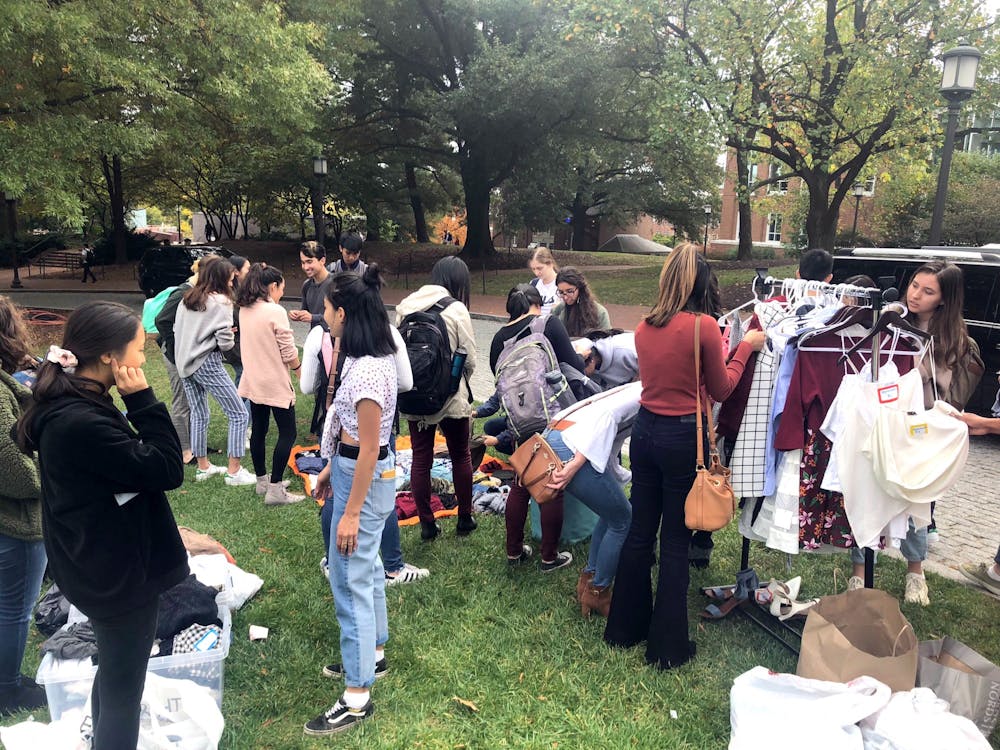Sustainable Hopkins Innovative Projects (SHIP) marked the launch of Blue Jay Threads, Hopkins first online and pop-up thrift store, with a clothing swap event at the Beach on Friday, Oct. 25.
SHIP is a student organization that aims to increase the University’s participation in sustainability initiatives through a variety of programs and events. SHIP presents climate change and sustainable development to Hopkins students and departments by implementing annual on-campus projects, organizing sustainability-related field trips and collaborating with off-campus, environmentally focused public and private partners.
Blue Jay Threads was created for two main reasons. According to sophomore Melanie Alfonzo, a member of SHIP’s Board, the University’s lack of an official clothing swap area was the primary force behind the creation of Blue Jay Threads. Other members of SHIP cited that fact that many other college campuses have an official clothing swap area, further emphasizing the need for Hopkins to establish its own.
Secondly, Blue Jay Threads was created as a solution for students who want to donate or sell their extra clothes but end up throwing them away due to their busy schedules. Alfonzo shared further insights into the thought process behind Blue Jay Threads.
“We figured starting Blue Jay Threads would leave an impact on the student body and inspire them to be more sustainable in their actions,” she wrote in an email to The News-Letter.
Overall, Blue Jay Threads was founded with the hope that participants would learn more about consumerism and fast fashion while actively taking part in an initiative that is meant to address and minimize the negative consequences of these issues. The issue of consumerism refers to the idea that as the demand for goods grows, so does the need to produce these goods.
Increasing the production of goods leads to an increase in pollution, land-use and deforestation, in addition to accelerating climate change. Fast fashion directly relates to consumerism as this refers to mass-market retailers rapidly producing inexpensive clothing to meet the demands of consumers hunting for the newest trends. Alfonzo also explained why donating clothing is so important.
“According to a 2018 study, the average American throws away 81 pounds of clothing a year. Multiplying that by our large population, clothing makes up a hefty chunk of landfill waste,” she wrote.
“Being able to donate clothing prevents those pieces from ending up in the landfill, and gives someone else the opportunity to enjoy new clothing.”
Alfonzo stated how purchasing donated or used clothing is sustainable.
“Buying second hand also reroutes the revenue that would have otherwise gone to the fast fashion industry, which is a large contributor to the environmental crisis,” she wrote.
Before Oct. 25, SHIP gathered the clothing sold at the launch of Blue Jay Threads in several ways. The organization collected clothing weekly at Shaffer Hall on Thursday evenings, took pick-up requests from students and set up donation bins in residence hall laundry rooms.
Students registered items they intended to donate or sell through a Google form that the organization set up. According to Alfonzo, the organization received over 200 items, many of which were free donations.
On the day of the Clothing Swap, SHIP set up a few tables with different activities on the Beach with the help of Eco-Reps and Refuel Our Future. One popular activity was the DIY T-shirt Tote Bag and Dog Toys table sponsored by Eco-Reps that allowed students to upcycle T-shirts that would have been donated or thrown away. Alfonzo revealed the important purpose of this creative activity.
“Upcycling things you already own can be an effective step towards a circular economy and reducing waste,” she said.
Attendees were also able to learn more about mobile marketplaces (buying and selling items remotely) or screen-print T-shirts with the help of Eco-Reps and Refuel Our Future, respectively. According to Alfonzo, after a successful launch, Blue Jay Threads plans to hold more events in the future.
“It’s one of SHIP’s goals to establish Blue Jay Threads as an ongoing marketplace where students can view, swap, and buy new pieces online at any time during the year,” she wrote.
Students should also be on the lookout for Blue Jay Threads’ very own “pop-up thrift store” events throughout the semester where students can physically sift through various options now that the project has officially launched.















